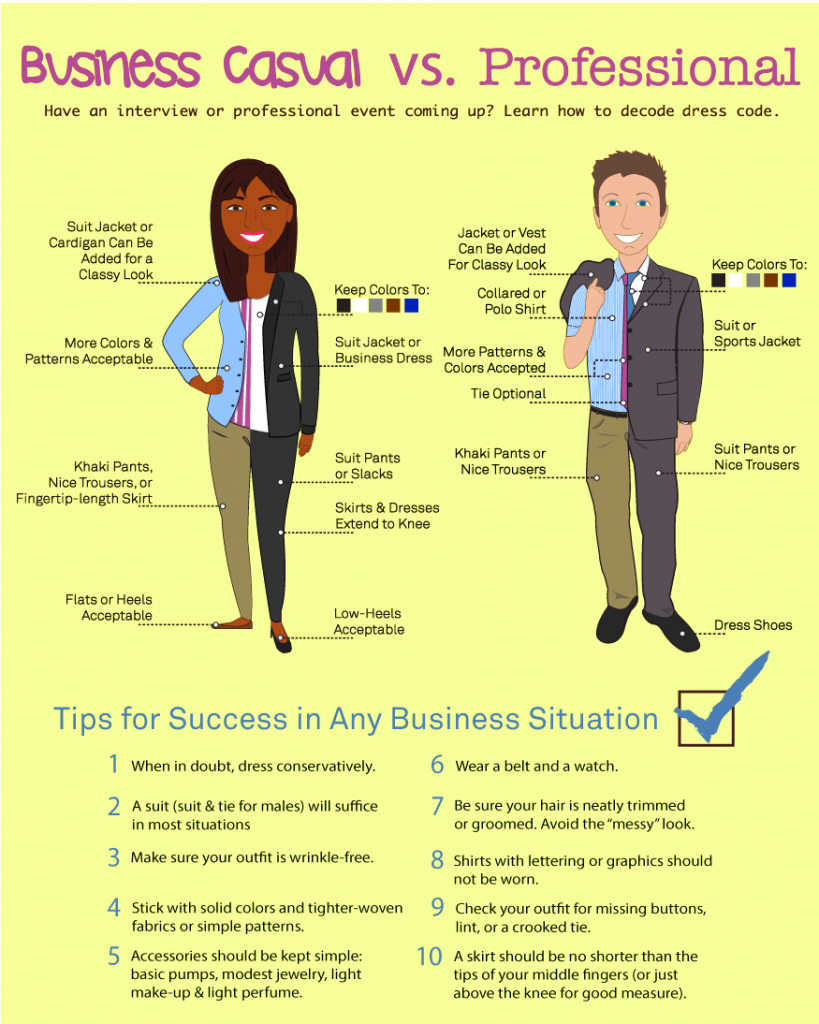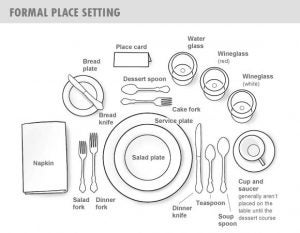First Impressions
Professional Appearance
Our appearance is the first thing others see when they meet us, therefore learning how to dress for the occasion is very important. As a student preparing to transition into a career you will need to change your casual attire into a professional look to build your credibility and show you are serious about that next step.
Just how formal your attire should be depends on the occasion and environment. If you are attending a career fair or an interview we recommend that you wear conservative business attire. This could also be true if you are attending a networking event or if you are conducting an informational interview. However, some employers favor a more relaxed atmosphere and they may prefer that you wear business casual or casual attire. If you are unsure of what is expected of you, it is best to ask or err on the side of formality and wear a suit.
Look through the Career Resource Guide to learn about various professional attire options and then determine what is most appropriate for your occasion.
Dining Etiquette
Often times you may be attending a networking event or an interview where you will have the opportunity to participate in a lunch or dinner. Figuring out which fork to use first or when to introduce yourself can be overwhelming. For more information on etiquette dinners, please contact our office at (252) 737-1236 or cobcareers@ecu.edu.
Communication
Communication is the number one skill employers look for when considering a candidate for a position, and there will be many opportunities for you to showcase that skill to potential employers. Here are some tips on how to make sure that you are making a good impression when you communicate with others.
Verbal Communication
- Speak Clearly – When engaging in a conversation with others you want to make sure that you can express your ideas clearly and concisely. Use effective vocal cues—speed, volume, inflection, conversational tone, to make sure the conversation flows smoothly. You don’t want to overwhelm someone you meet with a conversation that is one sided (you doing all the talking) and that seems to have no direction. Be careful not to use improper grammar, slang or make jokes when speaking.
- Listen Attentively – Part of being a good communicator is being a good listener. When talking to others make sure you are not monopolizing the conversation. You may learn a lot from others if you give them time to contribute to the conversation. Not listening attentively could lead to you misunderstanding or missing valuable information.
- Avoid:
- Speaking too slow, too fast, too loud or too quiet
- Mumbling, rambling, or having nothing to say
- Talking with your mouth full
- Using fillers such as “um,” “like” or “you know” too much
- Interrupting conversations
- Taking too much of a person’s time
Non-Verbal Communication
- Smile – A smile makes you appear more warm, friendly and confident. Remind yourself to smile throughout your encounter with others.
- Handshake – A firm and confident handshake is key to making a favorable first impression when greeting someone. Make eye contact with the other person as you shake their hand and make sure to exchange names. If you tend to get nervous when meeting new people make sure to carry a tissue in your pocket to help if you get clammy hands.
- Avoid:
- Shaking someone’s hand with a sweaty palm
- Shaking too aggressively or too faintly
- Body Posture – Your body posture can speak louder than words. Standing or sitting up straight shows interest and emits confidence to others. At the same time, a rigid posture may indicate to others that you feel tense and are uncomfortable. A natural upright body posture is the way to go.
- Eye Contact – Be sure to maintain eye contact with the person you are interacting with to build a rapport and to demonstrate your confidence. If you are uncomfortable with direct eye contact you will want to practice.
- Other Mannerisms – Be aware of other non-verbal mannerisms that could impact your first impression. Some of your non-verbal habits could lead you to come across as unprofessional, indifferent and insecure during your encounter with others.
- Avoid:
- Crossing your arms or slouching
- Staring at your watch or at other people
- Fidgeting with your hair, clicking a pen or wiggling your hands and feet
- Other nervous habits
Written Communication
The two most common ways in which you will showcase your written communication skills to an employer are through a cover letter and through email. Whether you are submitting a resume and cover letter or corresponding via email you need to be mindful of how your writing is going to be evaluated.
Avoid
- Using SMS Language (e.g. LOL, TTYL) or short texting language
- Asking too many questions via email
- Writing an informal message without punctuation or salutations

